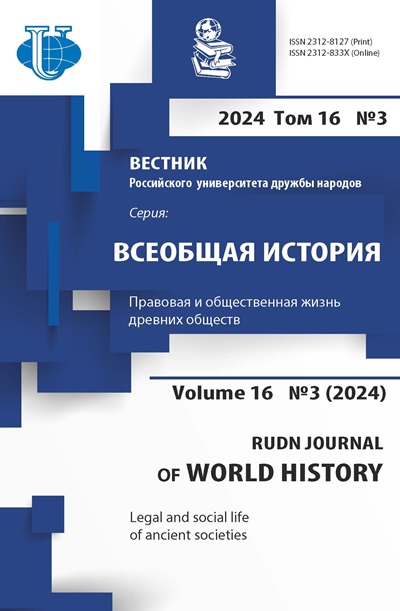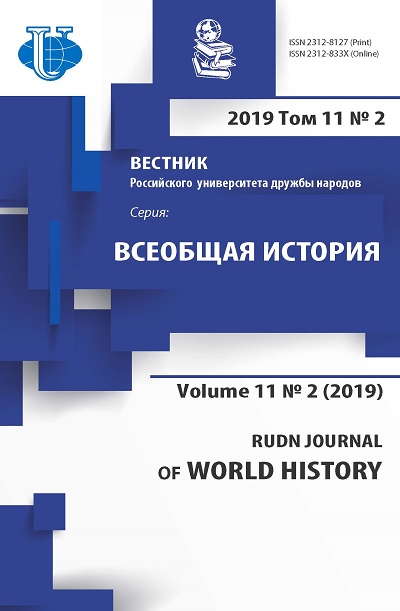Principle of trans-subjectivity in Luhmann’s historical methodology
- Authors: Alikberov A.K.1
-
Affiliations:
- Institute of Oriental Studies, RAS
- Issue: Vol 11, No 2 (2019)
- Pages: 172-178
- Section: Theory and methodolology in history
- URL: https://journals.rudn.ru/world-history/article/view/22487
- DOI: https://doi.org/10.22363/2312-8127-2019-11-2-172-178
Cite item
Full Text
Abstract
This article examines the problem of trans-subjectivity in Niklas Luhmann’s historical methodology. Trans-subjectivity, like inter-subjectivity, is understood in the humanities in different ways (N. Lossky, A. Bergson, I. Prigogine and others). Luhmann’s exploration of time leads him to devide it into “eternity” ( aeternitas ) and “system time” ( tempus ). Each manifestation of the latter is imbued with a special meaning that distinguishes one system time from another. History is reconstructed within the framework of the time dimension of meaning. These temporally measured meanings are the framework for reconstructing. This means that in historical methodology Luhmann essentially defended the principle of trans-subjectivism, although he denied the ontological positions of subject and object. In the framework of a forming system-communication approach significantly based on Luhmann’s historical methodology, trans-subjectivity becomes a new, more substantive and maximally realistic (and therefore more objective) understanding of the principle of historicism, when the past is viewed through the prism of the perception of a particular person, regarded as both the subject and the object of history. If in digital history such an ontological superposition is especially applicable thanks to the new conditions of an informal environment that allows for an almost total self-description of society (according to Luhmann), and records the digital footprints of social actions of the Ego , in non-digital traditional historical science it can also be used as a fertile conceptual scheme, and explanatory model.
About the authors
Alikber Kalabekovich Alikberov
Institute of Oriental Studies, RAS
Author for correspondence.
Email: alikberov@mail.ru
PhD in Historical Sciences, Deputy Director of the Institute of Oriental Studies, RAS
12 Rozhdestvenka St., Moscow, 107031, RussiaReferences
- Luhmann N. Vvedenie v sistemnuyu teoriyu [Introduction to system theory] / Ed. by Dirk Becker. Transl. from German K. Timofeeva. M.: Logos Publ., 2007.
- Antonovskiy A. Analitika vremeni: k transformacii «staroevropejskoj semantiki» v samoopisaniyah social’nyh sistem [Time Analysis: Towards a Transformation of “Old European Semantics” in the Self-Descriptions of Social Systems] // Luhman N. Samoopisaniya [Self-description]. Transl. from German / A. Antonovsky, B. Skuratov, K. Timofeeva. M.: Logos Publ., ITDGK “Gnosis”, 2009.
- Alikberov A.K. Sistemnaya logika kak instrument sistemnogo podhoda k istorii [System logic as a tool of a systematic approach to history]. In: Voprosy filosofii [Questions of Philosophy]. 2018. No. 2. P. 15–25.
- Losskiy N. Obosnovanie intuitivizma [Justification of intuitivism]. St. Petersburg: Type. M.M. Stasyulevich, 1906.
- Smelova N.E. Transsub”ektivnyj harakter opyta molitvy (S. Bulgakov and I. Il’in) [Transsubjective nature of the experience of prayer (S. Bulgakov and I. Ilyin)] In: Vestnik Tomskogo gosudarstvennogo universiteta [Tomsk State University Bulletin]. 2013. № 374. P. 64–67.
- Mazarsky M.V. Intersub”ektivnost’ i transsub”ektivnost’: Levinas, Puankare, Bergson, Prigozhin [Intersubjectivity and trans-subjectivity: Levinas, Poincare, Bergson, Prigogine] In: Filosofskie nauki [Philosophical Sciences]. 2010. No. 7. S. 50–64.
- Bergson A. Tvorcheskaya evolyuciya [Creative Evolution] / Transl. from French. V. Fleurova. Entry Art. I. Blauberg. M.: TERRA-Book Club; CANON-Press-C, 2001.
- Prigogine I. Ot sushchestvuyushchego k voznikayushchemu [From the Existing to the Emerging]. M.: Mir, 2002.
- Luhmann N. Samoopisaniya [Self-description]. Transl. from German. / A. Antonovsky, B. Skuratov, K. Timofeeva. M.: Logos Publ., ITDGK “Gnosis”, 2009.
- Luhmann N. Die Gesellscharft der Gesellshaft. Frankfurt/M.: Suhrkamp, 1997.
- Luhmann N. Evolyuciya [Evolution]. Transl. from German / A. Antonovsky. M.: Logos Publ., 2005.
- Luhmann N. Differenciaciya [Differentiation]. Transl. from German / B. Skuratov. M.: Logos Publ., 2006.













